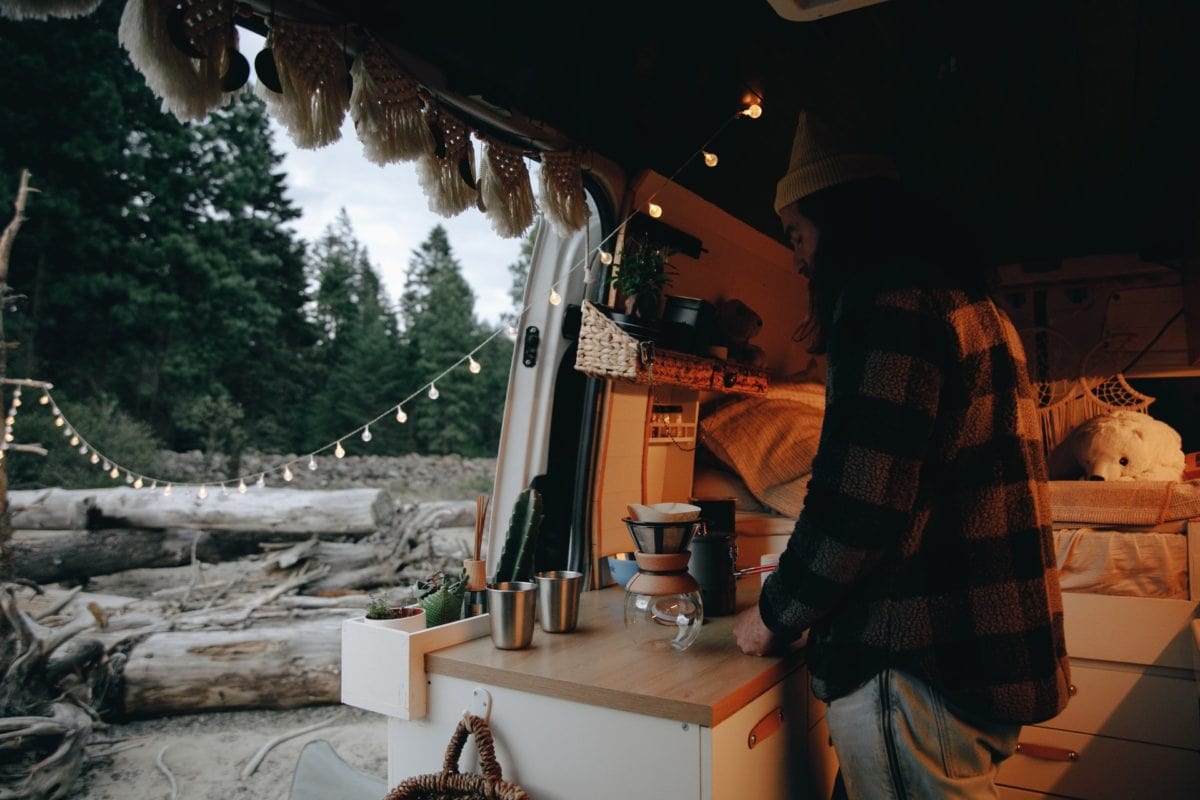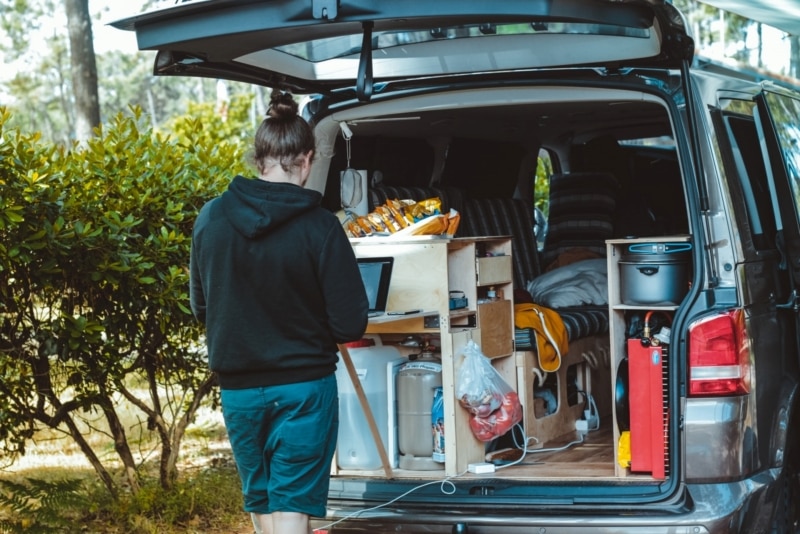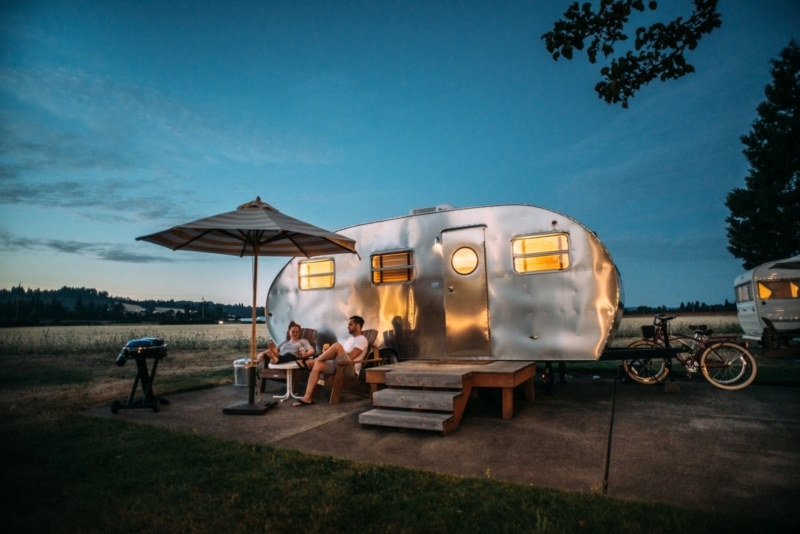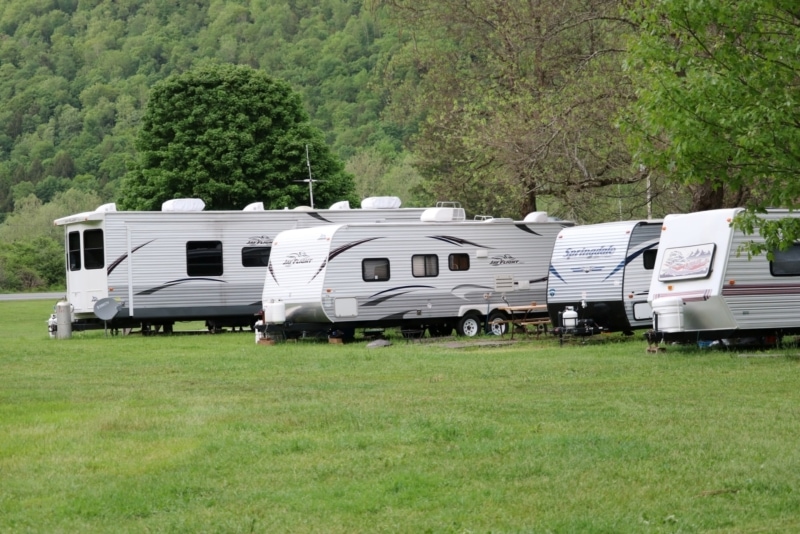20 Tips for Renting Out Your RV or Campervan

You’ve decided to list your RV or camper van for rent—what an exciting endeavor! You’ve considered the benefits, know you can make money renting your vehicle, and are now ready to dive in headfirst.
But it’s not quite as simple as just listing your RV and waiting for your first rental. There are several factors that go into successfully renting out your RV, and we want to make sure you’re prepared.
An RV owner myself, I’ve rented out my van and have many friends in the industry who have rented their RVs and motorhomes for years as well. Although it may require some organization and grunt work in the beginning, it will get easier the more you do it (and offset your RV payment)!
So, how do you maneuver your new RV business for optimal success? I’ve compiled 20 tips for successfully renting out your RV!
1. Secure Sufficient Insurance Coverage
One of the first things you should do when renting out your RV is acquire proper owners insurance for your vehicle, whether it be a Class A, B, C, or travel trailer. You don’t want to rent your RV without first having comprehensive insurance. This lightens the liability on RV owners and ensures coverage should an accident or damage occur during a rental.
Your RV insurance should include coverage against theft, loss, and accidents. Be sure to include liability, comprehensive collision coverage, and under/uninsured motorist coverage.
When deciding on insurance while renting out your RV, it’s worth it to pay for quality insurance. Spending a little more money now can help you save money in the case of an incident while it’s being rented out.
Note that not all auto insurance companies allow you to rent our your vehicle or cover other drivers. Be sure to go through a company like Roamly that allows you to rent out your RV and even partners directly with RV rental sites like Outdoorsy and RVshare.
Check out the best RV insurance companies here, which cover motorhomes, vans, travel trailers, and more!
2. Increase your Amenities
Consider upgrades that help make your vehicle more marketable.
For example, some people may want to bring their bikes along on their journey. Adding a tow/bike hitch costs under $200 and can increase the demand for your vehicle.
Another great amenity is an awning. Since most outdoor travelers are chasing good weather, having shade outside the RV makes for a much more pleasant spring or summer experience! You can even beef up your tires with more seasonally diverse options or all-terrain capability.
Consider using some of your extra income or revenue from your new side hustle to cover the costs, and if the improvement is significant enough, you can absolutely up your rental price!
3. Pursue Proper Maintenance
Inevitably, your RV will experience depreciation when you rent it out. One of the best ways to slow this process down is by staying on top of maintenance and general upkeep.
It’s easy for RV owners to put off minor repairs such as windshield wiper and filter replacements; however, most online RV rental platforms require a mechanical service every 90 days.
Most importantly, it ensures the safety of your passengers while traveling in your vehicle and helps avoid breakdowns on a trip.
4. Use High-Quality Photos
People will likely skim your images before they read the finer details. If your pictures are not enticing, you may lose potential renters’ interest.
Make sure your RV rental photos show all the interior and exterior details. Highlight all your camper’s best assets, whether it be ample storage space or a great kitchen. Show them the quality of your layout, conversion, or build.
Overall, you want to present what sets your RV apart from others they will be considering.

5. Write a Compelling Description
This is your chance to hype up your RV in your listing! A detailed listing description that gets people excited is bound to help secure a booking. Start with an enticing intro statement about your RV, such as “This beautiful, updated RV is everything you need for an amazing road trip!” It also helps to start with the unique amenities that make your RV stand apart from others.
Many RV rental platforms will have an amenities list where you can add the basics, such as how many the RV sleeps, water tank size, fuel capacity, and heater/AC information (especially important during the winter and summer months).
6. Provide a Thorough Supply List
When renting out your RV, provide a thorough supply list of everything your RV is equipped with. Listing the amenities included upfront when renting your RV will help avoid a bunch of back-and-forth communication later on.
Think about all the specs of your RV and use those as selling points! For example:
- Leather or heated seats
- Size of bed(s)
- Kitchen appliances
- Pots, pans, and dishes
- Extra kitchen gear
- Bathroom details
- Charging ports
- Bedding/Towels
- Storage options
7. Include Basic Camping Gear
When you are prepping your RV or motor home, think about the basics you would pack if you were going camping. A great basic list includes toilet paper, bedding, cleaning supplies, paper towels, olive oil, some spices, and cookware. New campers and non-RV owners will especially appreciate these free essentials.

8. Keep your RV Really Clean
Providing a clean RV may sound obvious but the cleaner you present your vehicle to your customers, the happier they will be.
Make sure you deep clean your entire RV before and after renting your RV. This includes linens, towels, and dishes, but also proper sanitizing. A thorough car wash, wiping down all surfaces, scrubbing the fridge and bathroom, vacuuming and wiping down the entire cab and dashboard, etc.
Check everything—you’d be surprised how many renters return an RV with food or drinks still in the fridge or storage cabinets. You can also choose to charge a cleaning fee when renting your RV to make some extra money.
9. Hone in on Pricing and Booking Strategy
While people want an RV that is comfortable and reliable, the honest truth is a lot of renters’ main limitation is cost. Figuring out the sweet spot for your nightly rental rate is a game-changer. Strategize beyond nightly rates—add-ons and extra amenities can help bring in more passive income and offset expenses.
Research your competition. Look at more RVs with a similar year, make and model, mileage, sleeping capacity, and overall quality. Check out security deposits, cleaning fees, cancellation policies, and weekly/monthly discounts.
You can even consider competing with the average nightly cost by charging just slightly under the average. You may make less money per trip, but you may be more likely to pull in more customers.
10. Request a Review
Whenever we search for a restaurant or hotel, we look at reviews. It’s a great way to receive honest information. The same applies to RV rentals.
Follow up with your renter after a trip and request they leave a positive review about their experience. In the same message, ask them how you can improve to make the next customer’s booking even better.
Letting recent customers know it helps you with future bookings will likely make them want to help you out, especially if they had a positive experience with you.
11. Provide Optional Add-Ons
For an extra fee, you can include optional add-ons for your renters to purchase. These are things that a normal rental may not include but would be helpful or enjoyable for their trip.
Some common add-ons include: hammocks, camping chairs, an outdoor portable table, camping gear (fire starters, tent, trekking poles, etc), and water gear (floaties, goggles, paddle board, etc.). Simply allow renters to add these extras to their booking for a few extra dollars a day, and watch the income add up (and pay off those RV payments faster)!

12. Be Upfront about Rules and Policies
There are many common rules and policies that RV owners put in place when they rent their RVs. The most frequently listed rules and policies include:
- Pets
- Festivals
- Smoking
- Tailgates
- One-way rentals
As an owner, you ultimately have to decide what you are and are not comfortable with. Maybe you’re more lenient on some policies than others, but including this information upfront will avoid miscommunication or potential unexpected and avoidable damage when renting your RV.
13. Provide Optional Drop-Off/Pick-Up Services
For an additional charge, you can offer drop-off and pick-up services for your RV before and after bookings. Most RV owners charge a certain amount per mile for the distance of delivery, with a minimum fee of around $25.
While this may require some coordinating on your end, this ends up being super convenient for renters. It helps them save time and offers a smoother take-off when renting your RV!
14. Encourage Longer Rentals with Discounts
Long-term renting is a gold mine because it requires less work from owners, while still pulling in great money. You only have to do the walk-through and cleaning process once.
Including weekly and monthly RV rental discounts will encourage these longer bookings. A great starting point is offering 10% off if an RV renter books a full week. You can also offer a monthly discount, often around 25%. You’d be surprised how many people are interested in long-term rentals, especially when they’re saving money!
15. Require High Tier Insurance Coverage
Certain rental platforms, such as Outdoorsy (the largest marketplace for renting out your RV), have varying levels of renters insurance. If you’re worried about your high RV worth, you can always decide to require a higher tier of insurance to rent out your RV.
Encourage or require your renters to obtain more than just the minimum insurance coverage. Premium add-ons such as roadside assistance and towing are extremely helpful, especially for first-time RV renters. It may cost renters a bit more money, but it will give both parties peace of mind.
The better RV insurance you require your renters to have, the less likely you’ll find yourself in a financial pickle. Plus, they’ll have a customer service department to contact in case of an accident.

16. Create an Operator’s Manual
Every RV is different, with their very own quirks. If you’ve ever rented an RV, you know how much of a learning curve there can be between different vehicles! People often feel overwhelmed during a walk-through, often forgetting your tips and tricks throughout their trip. A great way to handle this is by creating an RV operator’s manual.
Organize it in sections, such as “how to use the kitchen appliances”, or “filling up water tanks.” Bonus points if it can be accessed offline! Many renters will be exploring out of service so accessing online files can be tricky.
Be sure to walk them through this manual during their pick-up process. It also helps them feel comfortable if they know they can reach out to you with questions while renting your vehicle.
17. Consider Different Types of Renters
Most RV renters are individuals or couples, but being able to accommodate larger groups is a big up-sell. Get creative with your space and see if there are any changes you can make to sleep more campers.
If you can find a way for your RV to be able to host solo travelers, families, couples, and friend groups, you’ll widen your net of potential bookers!
As an RV owner, I’m sure friends and family have asked about the RV lifestyle. Try to rent to this community of people you trust!
Share your rental business on social media. Ask family or close friends to share the post and help spread the word about this unique travel experience. Renting your RV to people in your circle is a great way to reduce risk and get great reviews!
You can also encourage your renters to spread the good word after their trip. A large majority of RV booking requests come from word-of-mouth recommendations from previous renters.
19. Utilize Personal Discount Codes
One of the greatest things about managing your own listing and having complete control is that you can create custom discount codes for anything.
I’m talking friends and family discounts, discounts for renters that plan on low mileage, returning customer discounts, and honeymoon discounts. Whatever you can do to market your RV, make the cost more appealing, and create more business is a win!
One of the best ways I’ve seen discount codes utilized for RVs is by running “flash sales” and promoting them on social media. For example, “15% off any bookings made in the next 7 days!” This can increase your chances of securing customers and entices those who may not have considered renting before.
20. Offer Above-and-Beyond Customer Service
Lastly, provide above-and-beyond assistance in as many ways as you can. Examples of this include a free welcome basket with snacks, brochures of the area, a hand-written welcome card, and more. Many renters may ask for site-seeing recommendations, National Parks, or safe places to camp nearby.
These small touches go a long way with customer service, positive reviews, and an overall positive experience for others.
Now, You’re Ready to Launch
Choosing to rent out your RV is a big decision and there are many factors to consider. I hope these tips can help guide you to get the most out of your experience as an owner, while also helping your renters have the best road trips possible!




